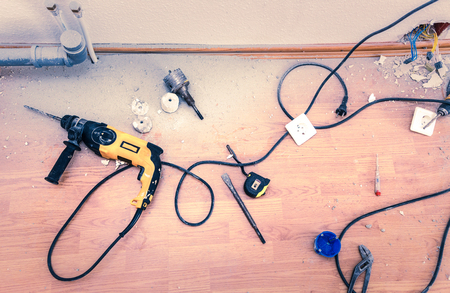Introduction to Compliance in UK Home Renovations
In the current landscape of UK property investment and home renovations, ensuring electrics and gas safety compliance has become a non-negotiable cornerstone for homeowners, developers, and investors alike. The surge in renovation activity—driven by shifting market demands, sustainability trends, and an appetite for modernised living spaces—has brought regulatory scrutiny to the forefront. Today’s buyers and tenants are more vigilant than ever about safety credentials, while local authorities and insurers impose stricter standards. Compliance is not simply a legal checkbox; it directly impacts property value, saleability, rental yields, and long-term risk mitigation. As regulatory frameworks evolve and enforcement intensifies across the UK, understanding your obligations regarding electrical and gas systems during renovation projects is essential—not only to avoid substantial fines or project delays but also to future-proof your investment in a competitive marketplace.
2. Key Legal Obligations for Homeowners and Landlords
When undertaking home renovations in the UK, both homeowners and landlords are subject to a robust legal framework governing electrics and gas safety. Compliance is not only essential for protecting occupants but also a statutory requirement with serious financial and legal ramifications for non-compliance. This section offers an insight into the key regulations and the specific responsibilities property owners must uphold.
Electrical Safety Regulations
The primary legislation regulating electrical systems in domestic properties is the Building Regulations Part P. These rules mandate that all electrical installation work in homes—whether in kitchens, bathrooms, or outdoors—must be designed and installed to prevent fire and electric shock. In England and Wales, Part P requires certain types of work to be notified to local authorities or carried out by a registered ‘Competent Person’ scheme electrician.
| Requirement | Homeowner Responsibility | Landlord Responsibility |
|---|---|---|
| Electrical Installation Condition Report (EICR) | Recommended after major renovations | Mandatory every 5 years (England & Scotland) |
| Part P Notification | Notify local authority or use registered electrician | As above; applies equally |
| Use of Competent Persons | Advisable for all work | Legally required for rental properties |
Gas Safety Regulations
The Gas Safety (Installation and Use) Regulations 1998 govern the safe installation, maintenance, and use of gas appliances, fittings, and flues. All gas work must be performed by a qualified Gas Safe registered engineer. For landlords, there is an explicit duty to arrange annual gas safety checks and maintain records using the Landlord Gas Safety Record (LGSR).
| Gas Compliance Requirement | Homeowner Obligation | Landlord Obligation |
|---|---|---|
| Installation by Gas Safe Engineer | Required for new installations/renovations | Required for all works, including repairs & servicing |
| Annual Gas Safety Check | N/A unless letting part of property | Legal requirement; certificate must be provided to tenants |
| Record Keeping (LGSR) | N/A unless renting out rooms/property | Must keep records for at least 2 years; issue to tenants within 28 days of check |
Civil and Criminal Liabilities
Breach of these obligations can lead to prosecution, unlimited fines, invalidation of insurance policies, and—in severe cases—imprisonment. Mortgage lenders may also refuse to lend on non-compliant properties. Therefore, understanding and fulfilling these obligations is crucial for anyone involved in UK property renovations.
![]()
3. Certification and Approved Professionals
Ensuring electrical and gas safety compliance during UK home renovations hinges on hiring accredited professionals and obtaining the correct certification. Appointing a fully qualified electrician who is registered with a government-approved scheme, such as NICEIC or NAPIT, is crucial for all electrical works. Similarly, only Gas Safe registered engineers are legally permitted to carry out any work involving gas appliances or pipework. This not only guarantees the quality and safety of the installation but also ensures that all work meets stringent British standards.
Upon completion of electrical installations or significant alterations, homeowners must obtain an Electrical Installation Condition Report (EICR). This report assesses the safety of existing wiring and highlights any urgent remedial actions required to comply with UK regulations. For rental properties, EICRs are mandatory every five years, but even owner-occupiers are increasingly expected to have up-to-date reports in place, especially when selling or insuring a property.
When it comes to gas safety, a Gas Safety Certificate (CP12) is essential for both landlords and those undertaking major refurbishments involving gas appliances. The certificate confirms that all appliances, flues, and related pipework have been checked by a qualified professional and are safe for use. Failure to secure these certificates can lead to legal consequences, invalidate insurance policies, and significantly impact property value.
In short, working with accredited electricians and Gas Safe registered engineers not only ensures compliance with UK law but also protects your investment by minimising risk and providing documented proof of safety—a key factor for both current residents and future buyers.
4. Compliance Procedures During Renovation Projects
Ensuring electrics and gas safety compliance during UK home renovations is a multi-stage process, directly impacting both legal standing and long-term property value. Investors and homeowners alike should adopt systematic procedures to safeguard their assets, minimise risk, and satisfy regulatory requirements throughout the renovation timeline.
Step-by-Step Approach to Compliance
| Stage | Key Actions | Best Practices |
|---|---|---|
| Planning | Engage certified professionals (e.g., NICEIC-registered electricians, Gas Safe engineers). Obtain necessary permits and review building regulations. | Request references and certificates; ensure clear documentation of project scope. |
| Implementation | Conduct regular site inspections; keep installation work in line with Part P (electrics) and Gas Safety (Installation and Use) Regulations 1998. Maintain accurate records of all works undertaken. | Use checklists for ongoing compliance; schedule interim assessments by competent persons. |
| Final Checks | Arrange for required testing, certification (Electrical Installation Certificate or Minor Works Certificate), and Gas Safety Records. Rectify any non-compliance issues prior to project sign-off. | Retain all certificates for future sale or letting; share documentation with relevant authorities if needed. |
Investment Protection Through Due Diligence
Proactive compliance not only reduces the risk of legal penalties but also preserves property value by ensuring a safe, market-ready asset. Investors should factor compliance costs into renovation budgets and timelines from the outset. Engage with local authorities early in the planning phase, as retrospective remediation can be costly and may affect ROI.
Key Tip: A well-documented compliance process can streamline future transactions, enhance buyer confidence, and support favourable valuations during resale or remortgage.
Ongoing Monitoring and Maintenance
The responsibility for electrics and gas safety does not end upon completion. Schedule periodic inspections post-renovation—at least every five years for electrical installations, annually for gas appliances—to uphold legal standards and protect your investment over time.
Staying ahead of compliance requirements is not just a regulatory obligation—it’s a strategic move to future-proof your UK property portfolio.
5. Penalties and Risks of Non-Compliance
Failing to meet electrics and gas safety compliance in UK home renovations carries a host of significant legal, financial, and insurance-related risks that directly affect both homeowners and property investors. From a legal perspective, non-compliance with regulations such as the Electrical Safety Standards in the Private Rented Sector (England) Regulations 2020 or the Gas Safety (Installation and Use) Regulations 1998 can result in severe penalties. Local authorities are empowered to impose fines of up to £30,000 for breaches relating to electrical safety and unlimited fines or even custodial sentences for severe gas safety violations, especially where tenant safety is compromised.
Financial Consequences
The financial fallout extends beyond immediate fines. Renovators who sidestep compliance may face costly remedial works, delays in project completion, and potential void periods if properties cannot be legally let. Moreover, mortgage lenders often require up-to-date safety certificates; lacking these can jeopardise refinancing options or sales transactions, undermining liquidity and portfolio growth.
Insurance Implications
Non-compliance also has substantial insurance implications. Insurers may refuse to honour claims arising from incidents linked to unapproved or unsafe electrical or gas work. This could leave homeowners facing extensive out-of-pocket expenses following fire, explosion, or carbon monoxide poisoning events—risks that are not only financially crippling but also expose parties to personal injury litigation.
Impact on Property Value and Investor Confidence
Perhaps most crucially for investors, a poor compliance record can dramatically reduce a propertys market value. Buyers and tenants are increasingly discerning regarding safety standards, and a lack of valid certification will deter prospective purchasers, erode rental yields, and prolong time on the market. Additionally, investor confidence across the UK property sector depends heavily on regulatory reliability; persistent non-compliance signals higher risk, dampening appetite from both domestic and international capital seeking stable returns within the British housing market.
6. Emerging Trends and Future Regulations
As the UK home renovation market evolves, electrics and gas safety compliance is increasingly influenced by two powerful forces: sustainability and smart technology. These market-driven trends are not only changing consumer expectations but are also shaping forthcoming regulatory requirements across the sector.
Sustainability as a Regulatory Driver
The UK’s commitment to achieving net zero carbon emissions by 2050 has put sustainable renovation practices in the spotlight. Regulations such as the Minimum Energy Efficiency Standards (MEES) have already set a precedent, requiring landlords to upgrade electrics and heating systems to improve energy performance. Looking ahead, it is expected that future compliance frameworks will mandate even more stringent standards for insulation, efficient appliances, and renewable energy integration—making eco-friendly electrics and gas solutions an investment necessity for forward-thinking renovators.
Smart Technology Integration
Smart home technologies are rapidly transitioning from luxury features to standard compliance tools. Devices like smart meters, intelligent thermostats, and remote gas shut-off valves are not only enhancing household safety but are also providing real-time data for ongoing compliance monitoring. The government’s Smart Meter rollout aims for every home to have access by 2025, suggesting that digital connectivity will become a foundational element of safety regulations for electrics and gas installations in the near future.
Market Implications and Investor Considerations
For property investors and developers, keeping abreast of these trends is crucial. Incorporating sustainable materials and smart safety systems can drive both regulatory compliance and market value, appealing to environmentally conscious buyers and renters. As regulatory frameworks tighten around sustainability and digital verification, those who adapt early will mitigate compliance risks and unlock competitive advantages in the evolving UK housing landscape.
7. Conclusion and Investment Takeaways
In summary, navigating the complexities of electrics and gas safety compliance is not just a legal requirement but a strategic move for both homeowners and property investors in the UK. Ensuring that all electrical and gas installations are certified by qualified professionals underpins both occupant safety and long-term asset protection. For investors, full compliance is an essential factor in enhancing rental yield, securing insurance coverage, and avoiding costly legal disputes.
Key Points to Remember
- Legal Obligations: Always adhere to Part P of the Building Regulations for electrics and maintain up-to-date Gas Safety Certificates for all appliances.
- Qualified Professionals: Engage NICEIC-registered electricians and Gas Safe engineers to guarantee work meets current standards.
- Documentation: Retain all certificates, inspection reports, and service records as evidence of compliance—these documents are critical during property transactions or lettings.
Actionable Advice for Homeowners
- Schedule regular safety inspections, especially before major renovations or new tenancies.
- Invest in modern systems—upgrading outdated wiring or boilers can significantly boost property value and tenant appeal.
Investment Perspective
- Properties with verifiable safety compliance often attract premium valuations and a wider pool of buyers or tenants.
- Proactive compliance reduces risk, futureproofs your asset, and demonstrates due diligence—a key consideration for savvy investors operating in a highly regulated UK market.
Final Thought
By embedding robust electrics and gas safety practices into your renovation strategy, you not only safeguard your investment but also position your property at the forefront of the competitive UK housing landscape. Compliance today secures value tomorrow—make it a cornerstone of your renovation approach.

